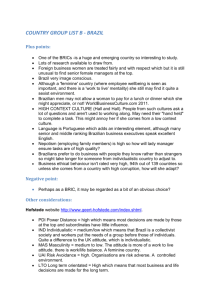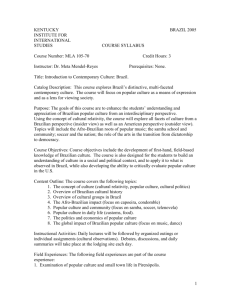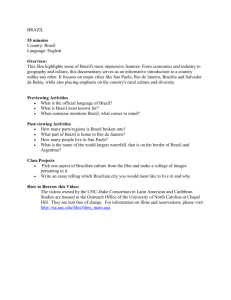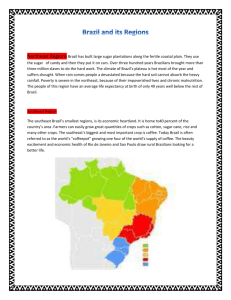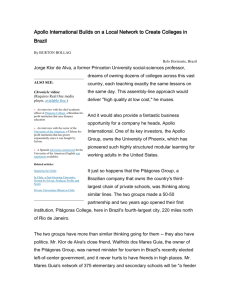Imports in 2006
advertisement
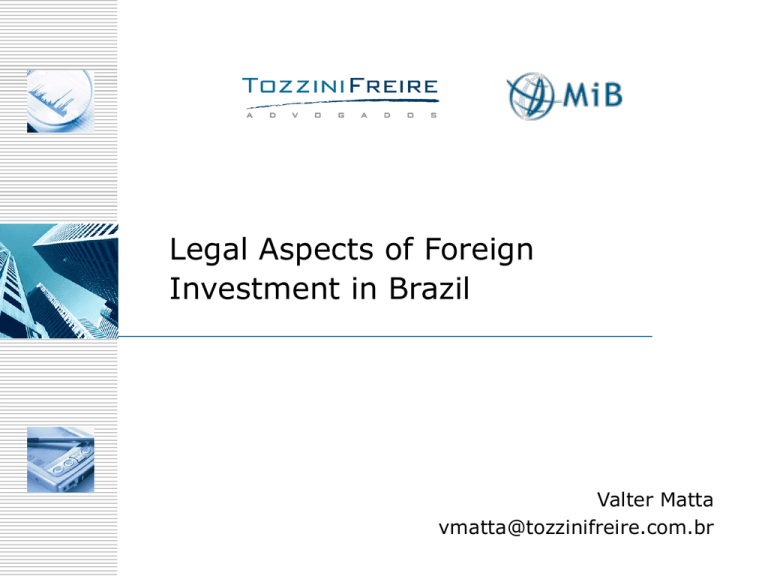
Legal Aspects of Foreign Investment in Brazil Valter Matta vmatta@tozzinifreire.com.br Brazil Federative Republic of Brazil Dimensions: Half of South America’s territory. 9 times size of France Population: 189 million (5th in the world) people Official Language: Portuguese Federative Republic of Brazil Federative Republic of Brazil EXECUTIVE BRANCH LEGISLATIVE BRANCH PRESIDENCY OF THE REPUBLIC NATIONAL CONGRESS (MR. LUIZ INÁCIO LULA DA SILVA) MINISTRIES FEDERAL SENATE (81 members) CHAMBER OF FEDERAL DEPUTIES (513 members) Federative Republic of Brazil JUDICIARY BRANCH FEDERAL SUPREME COURT FEDERAL APPEALS COURT STATE COURT OF APPEALS (2nd Instance) FEDERAL COURT OF APPEALS (2nd Instance) STATE COURTS (1st Instance) FEDERAL COURTS (1st Instance) Economic Indicators GDP GDP per capita US$ 1,150,000 million (2006) US$ 6,085 (2006) GDP Growth Inflation Consumers Priced Index (12 months) 3.7% (2006) 4.7% (2007 – estimate) 2006: 3.14% 2007: 4%* (*) official estimate – Central Bank Economic Activities Largest producer and exporter of coffee, orange juice, sugar and ethanol Largest producer and exporter of iron ore Largest exporter of soybean, beef and chicken 4th aircraft producer (largest producer of regional aviation jets) 9th car exporter 4th steel exporter 8th software producer A leader in oil exploitation in deep waters Exports Exports in 2006 US$ 137,471 billion * (*) Ministry of Development, Industry and Commerce Imports Imports in 2006 * US$ 91,394 billion Major imports * Machinery and electrical equipment, chemical products, and oil (*) Ministry of Development, Industry and Commerce Foreign Direct Investment 6,384 Foreign Direct Investment 4,644 4,507 4,433 US$ (million) 3,495 3,208 1,974 1,514 1,078 1,661 1,435 1,285 1,22 1,388 0,848 0,782 1,458 0,745 0,779 0,648 0,26 2005 Total: US$ 21,638,000,000 2006 Total: US$ 22,225,000,000 0,117 Foreign Direct Investment 2005 2006 2007 (July) US$ 21,638,000,000 US$ 22,225,000,000 US$ 24,700,000,000 Foreign Direct Investment Restrictions for foreign investment: Nuclear energy Healthcare services Mail and telegraph (Federal Law 6538/1978) Domestic aviation, aerospace and airport infrastructure Rural property ownership limited to size Mining: companies (even under foreign control) may apply for a license to operate in the mining sector Newspapers and broadcasting companies: foreigners cannot hold more than 30% of Brazilian press and broadcasting companies Business Opportunities PAC The Federal Government has launched a program in 2007 named PAC (Growth Acceleration Program). In general terms, PAC’s target is the economic growth of Brazil, through the incentive to credit and financing, and infrastructure projects. Amount of investments expected (up to 2010): US$ 251 billion Main sectors: – Energy: US$ 137 billion – Transportation: US$ 29 billion – Water Sector: US$ 20 billion Business Opportunities TRANSPORTATION Forecast of investment in transportation 2007-2010 – Highway: US$ 16.7 billion – Railway: US$ 4 billion – Port: US$ 1.35 billion – Airport: US$ 1.5 billion – Merchant Navy: US$ 5.3 billion Business Opportunities Sectors: Forestry, Wood Sourcing, Paper and Pulp Ethanol Production Mining Oil and Gas Consumer Products Infrastructure Investment Structures Investment Structures Indirect Investment: Distribution and sales representation agreements: often precede the establishment of a direct local presence Direct Investment: Incorporation of a subsidiary: where market conditions support a local presence and associated investment costs Joint Venture Acquisition of a local company Indirect Investment - Distribution Applicable regulation: distribution agreements are not subject to specific regulations. The general contractual provisions of the Civil Code applies Territory: sale by distributor is subject to defined territory Termination: the termination is subject to distributor recovering investments Indirect Investment - Sales Representation Sales Representation Agreements: Are subject to specific regulations (Law 4886/65, amended by Law 5420/90 and Civil Code, articles 710 to 721) Sales Representatives: Do not acquire products in their own name, but merely act as intermediaries in the sale of products Entitled to commissions based on sales (direct or indirect) Termination: – Fixed term agreement: average monthly commission multiplied by ½ of remaining months – Indeterminate term: 1/12 of commissions paid during the life of the agreement Direct Investment - Joint Venture Memorandum of Understanding: preliminary, binding or nonbinding document Joint Venture relationship By-laws: the company is governed by its articles of association or by-laws Shareholders Agreement: governs the relationship between shareholders, especially in connection with the transfer of shares and voting rights Agreement: broad rules of the parties’ Direct Investment - Acquisition Memorandum of Understanding: preliminary, binding or nonbinding document Due diligence – Sensitive areas: tax, labor and environmental matters Share Purchase Agreement Types of Brazilian entities Limited Liability Company (Sociedade Limitada): Governed by the Civil Code At least two partners (quotaholders) Articles of Association Transfers of quotas and capital increases require amendment to Articles of Association Managers must be domiciled in Brazil No Board of Directors Types of Brazilian entities Corporation (Sociedade Anônima - S.A.): Governed by the Corporations Law Must have at least two shareholders (except for whollyowned subsidiaries) By-laws Transfer of capital does not need to be reflected in an amendment to the by-laws Shares may be traded at stock exchange Shares may be voting or non-voting (non-voting up to 50% of the capital) May issue other securities: debentures and warrants Shareholders meetings: Annual and Extraordinary Types of Brazilian entities Management of the Corporation Administrative Council – similar to U.S. Board of Directors – certain corporate resolutions and election of Board of Officers – board members must be shareholders Board of Officers – representation of the company – members domiciled in Brazil Financial Statements must be published yearly Foreign Entities’ Branches Yes, it is possible to open a branch of a foreign entity in Brazil, although … Time consuming Several requirements, including governmental authorization Some governmental agencies are not familiar with Foreign Entities’ Branches Any changes in the by-laws of the foreign company must be approved by the Brazilian Government to be effective in Brazil Central Bank Foreign Capital Registration Must be registered with the Central Bank: – Direct investments of Brazilian companies, either made in cash or in assets – Cross border loans and financings Registration entitles access to foreign exchange market to repatriate investment, receive dividend, principal and interest payments Foreign exchange transactions require execution of a foreign exchange contract with commercial bank Taxation Tax Treaties for avoidance of double taxation Argentina Austria Canada Chile Czech Republic Slovak Republic Ecuador Finland Hungary India Japan Korea Netherlands Norway Portugal Spain Germany (currently not in force) Belgium China Denmark France Italy Luxembourg Philippines Sweden Taxation TAX Federal Corporate Income Tax (“IRPJ”) Federal Social Contribution on Net Profits (“CSLL”) Withholding Income Tax on Remittances Abroad Federal Individual Income Tax (“IRPF”) Distribution of Dividends RATE 15% + 10% on any amount in excess of US$ 120,000/year 9% 15% (basic rate) 25% (tax haven jurisdiction) Progressive rate (15% to 27.5%) 0 Federal Tax on Manufactured Products (“IPI”) Variable as per product classification State Tax On Distribution of Goods (“ICMS”) 7% to 25% Municipal Tax on Services (“ISS”) 2% to 5% Federal Contribution on Financial Transfer of Credits (“CPMF”) 0.38% Import and Export RADAR – MAIN TYPES Simplified RADAR: Import / export operations up to US$ 150,000.00 in a period of six months (cap does not apply to fixed assets) Less control / less documentation to be provided 1 to 3 months to be obtained Ordinary RADAR: Higher limits to import / export operations (granted by IRS) Strict control / lots of documentation to be provided (tax assessment, including financial capacity) 3 to 6 months to be obtained RADAR – FINANCIAL CAPACITY Subjectivity: IRS sole discretion Objectives: Financial capacity to pay for import operations for 6 (six) months term. Prevention of fraud/money laundering Assessments: Investments, assets, cash flow, previous operations Importation using a third Company Importation on behalf of a third party (importação por conta e ordem de terceiros): The trading company is a service provider to the final owner Services Agreement submitted to IRS Importation under order (importação por encomenda) The importation is made by the importer with the final owners’ own financial resource (no payments in advance are allowed) The trading company sells the imported goods to the final owner Sales Agreement submitted to IRS Anti-Trust Merger Notification Required whenever: The companies (buyer and target) have a combined market share of 20% Either party has gross revenues in Brazil higher than US$ 200 million Filing within 15 business days of the first binding document Environmental Licenses Environmental License Environmental Licensing Procedure Previous license – relates to feasibility of the project Installation license – authorizes construction of the project Operating license – authorizes implementation of the project – Environmental Impacts Studies (EIS) required depending on environmental impact of the project – Licensing usually at state level (low impact activities may be licensed by the Municipalities whenever an agreement exists between the States and Municipalities) but cross border projects may require federal licensing Labor Relations Labor Relations Working hours: eight hours per day and forty-four hours per week Salary: legal minimum salary (approximately US$ 200) Vacation: 30 days per year and a vacation bonus equivalent to one-third of monthly salary Christmas bonus: “thirteenth salary” Labor Relations - Cost E M P LO Y E E LA B O R C H A R GES S O C IA L S E C UR IT Y C H A R GES C OM EN T S/ R IS KS IN D E P E N D E N T C ON T R A C T OR P ER SON Approximately 32% of monthly Open for negotiation salary: 13o.salary, vacation and FGTS 28% 20% Services under Other benefits subordination and in the on habitual basis: collective risk of labor claim for bargainig recognition of an agreement employment relationship IN D E P E N D E N T C ON T R A C T OR LE G A L E N T IT Y O UT S O UR C IN G ( C LE A N IN G , G UA R D , ET C ) T EM P OR A R Y WO R KE R T R A IN E E _ _ _ Open for negotiation - - - - Risk of labor claim and secondary liability Maximum term of The company has 90 days Activities secondary liability extendable for relating to for labor obligations. equal term. the The outsourcing is Workers should graduation allowed to non core be employees of course. business activities. the employment agency. Labor Relations – Cost Simulation (Employee) LABOR CHARGE CALCULATION Base Salary Monthly Christimas Bonus Reserve Monthly Vacation Reserve + 1/3 Severance Pay Fund "FGTS" (8%) Social Security "INSS" (28%) Subtotal Meal Transportation (up to 6%) Health Insurance Total US$ 1,000.00 US$ 83.00 US$ 111.00 US$ 95.00 US$ 334.00 US$ 1,623.00 US$ 269.00 US$ 72.00 US$ 150.00 US$ 1.996.43 Labor Relations – Unions and Job Stability Unions: Employees are legally allowed to be submitted to a Union Job Stability – Expectant mothers: 5 months after delivery – Union directors: 1 year after their term in office – Members of the Accident Prevention Committees (CIPA) –1 year after their term in office – Employees injured due to accident at work site or professional disease: 1 year after returning to work Other rights: set forth in collective bargaining agreements Labor Relations – Types of Work Visa Business: 90 days per year; may be extended for more equal term Temporary: applicable to employee (up to 2 years) and technical assistant (up to 1 year) Permanent: for officers/managers appointed in the by-laws – Investment of US$ 200,000 or US$ 50,000 + 10 new job positions in the company in the next 2 years – Same term of the appointment, limited to 5 years. May be extended Intellectual Property Intellectual Property The Brazilian Patent and Trademark Office (“INPI”): granting and control of industrial property rights Applications for trademark registration Issuance of letters of patent Certification of licensing agreements (registration of technology transfer, trademark licenses and patent licenses agreements) Both foreign and Brazilian industrial property rights must be registered in Brazil The remittance of royalties must be registered with BACEN Dos and Don'ts for doing business in Brazil Dos and Don´ts Be patient… red tape, government, licensing, regulatory instability Dos and Don´ts Remember that Brazil is a civil law country Dos and Don´ts Don’t even try to understand the Brazilian tax system Dos and Don´ts Register your investment with the Central Bank Dos and Don´ts Be patient!! Cultural differences, delays Dos and Don´ts Do not focus only on numbers

